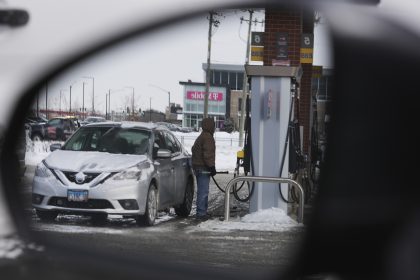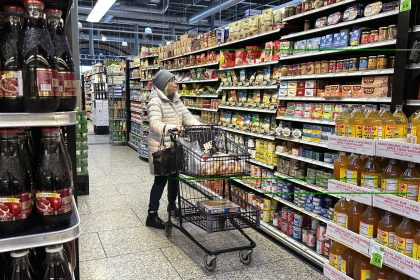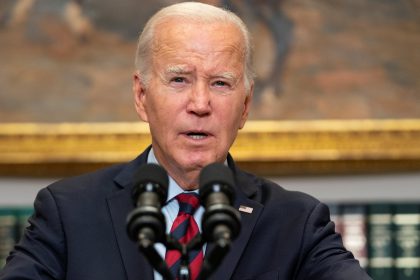Nearly Three-Out-Of-Four Economists Believe US Will Be In Recession by 2021, Survey Finds

WASHINGTON — Seventy-four percent of U.S. business economists participating in a new survey believe the United States will slip into a recession by the end of 2021, despite the White House’s insistence that the “fundamentals” of the economy remain strong.
The survey, released Monday, was conducted by the National Association for Business Economics. The consensus it found is similar to that found in a survey in February.
What’s changed is the timeline, with many of the respondent economists now believing the recession will arrive a little later than originally expected, and after the 2020 presidential election.
While 38 percent of economists surveyed believe the slowing economy will go into recession next year, that’s down from 42 percent in February. On the other hand, 34% now believe the recession will arrive in 2021, but that number is up from 25% in February.
Another 2% of those polled expect a recession to begin this year.
In February, 77% of the economists expected a recession either this year, next year or in 2021.
A strong economy is the cornerstone of President Donald Trump’s 2020 re-election campaign, yet in recent days the administration has been repeatedly buffeted by bad economic news, including a 6.4% drop in consumer confidence since July and wild swings on the stock market in response to recession fears.
Despite this, the president himself is rejecting any claims the boom that started in the Obama administration is ending in his.
“We’re doing tremendously well. Our consumers are rich. I gave a tremendous tax cut and they’re loaded up with money,” Trump tweeted on Sunday. “I don’t think we’re having a recession.”
And in a conversation with reporters on Monday senior Trump adviser Kellyanne Conway said “The fact is, the fundamentals of our economy are very strong.”
Still, evidently hedging his bets, the president took to Twitter on Monday to urge the Federal Reserve to stimulate the economy by cutting interest rates and returning to “quantitative easing” of its monetary policy.
The latest NABE survey was conducted between July 14 and Aug. 1, before the financial markets last week signaled the possibility of a U.S. recession, sending the Dow Jones Industrial Average into its biggest one-day drop of the year.
The 226 economists responding work mainly for corporations and trade associations.
Survey respondents were nearly unanimous (96%) in support of the Federal Reserve continuing to have congressional oversight and policy independence. Few respondents (1%) prefer that the Fed be overseen by the executive branch, and fewer than 1% of respondents suggest that the Fed should be controlled by either branch of government.
The survey also took note of President Trump’s repeated criticism of the Fed and its chairman, Jerome Powell. Although a solid majority (55%) believes his remarks do not influence Fed decisions, they do believe his comments undermine public trust in the bank.
Over a quarter of respondents (27%) suggest the president’s remarks cause the Fed to be more dovish than otherwise, thus threatening its independence. A small percentage (7%) see President Trump’s remarks in a more positive light, believing such comments encourage public debate and serve as a check on Fed decisions.
On a related note, a majority of respondents (56%) believes that the Tax Cuts and Jobs Act has had an overall negative impact on housing activity over the past 18 months. Approximately a quarter of respondents believe that the changes to the standard, mortgage interest, and state and local tax deductions have had no impact on the housing market, while 7% view the tax cut Act impact positively.
Panelists overall are against forgiving most or all student debt in the U.S., with a majority (64%) believing this would be a net negative for the U.S. economy. Approximately one-fifth believes that forgiving most or all student debt would be positive for the economy.
Sixty-one percent of survey respondents are in favor of raising the federal minimum wage, currently at $7.25 an hour. Approximately 40%, however, think it should be raised without exception, while 20% believe it should be increased with some exceptions (such as for tipped workers or teenagers). Nineteen percent suggest the federal minimum wage should be abolished, while 11% believe there is no need to raise it.
The economists also weighed in on Trump’s tariffs and higher budget deficits, which they said could eventually dampen the economy.
The Trump administration has imposed tariffs on goods from many key U.S. trading partners, from China and Europe to Mexico and Canada. Officials maintain that the tariffs, which are taxes on imports, will help the administration gain more favorable terms of trade. But U.S. trading partners have simply retaliated with tariffs of their own.
Trade between the U.S. and China, the two biggest global economies, has declined significantly.
That’s one reason Trump decided last week to postpone until Dec. 15 tariffs on about 60% of an additional $300 billion of Chinese imports, granting a reprieve from a planned move that would have extended duties to nearly everything the U.S. buys from China.
The economists surveyed by the NABE were skeptical about prospects for success of the latest round of U.S.-China trade negotiations. Only 5% predicted that a comprehensive trade deal would result, 64% suggested a superficial agreement was possible and nearly 25% expected nothing to be agreed upon by the two countries.























